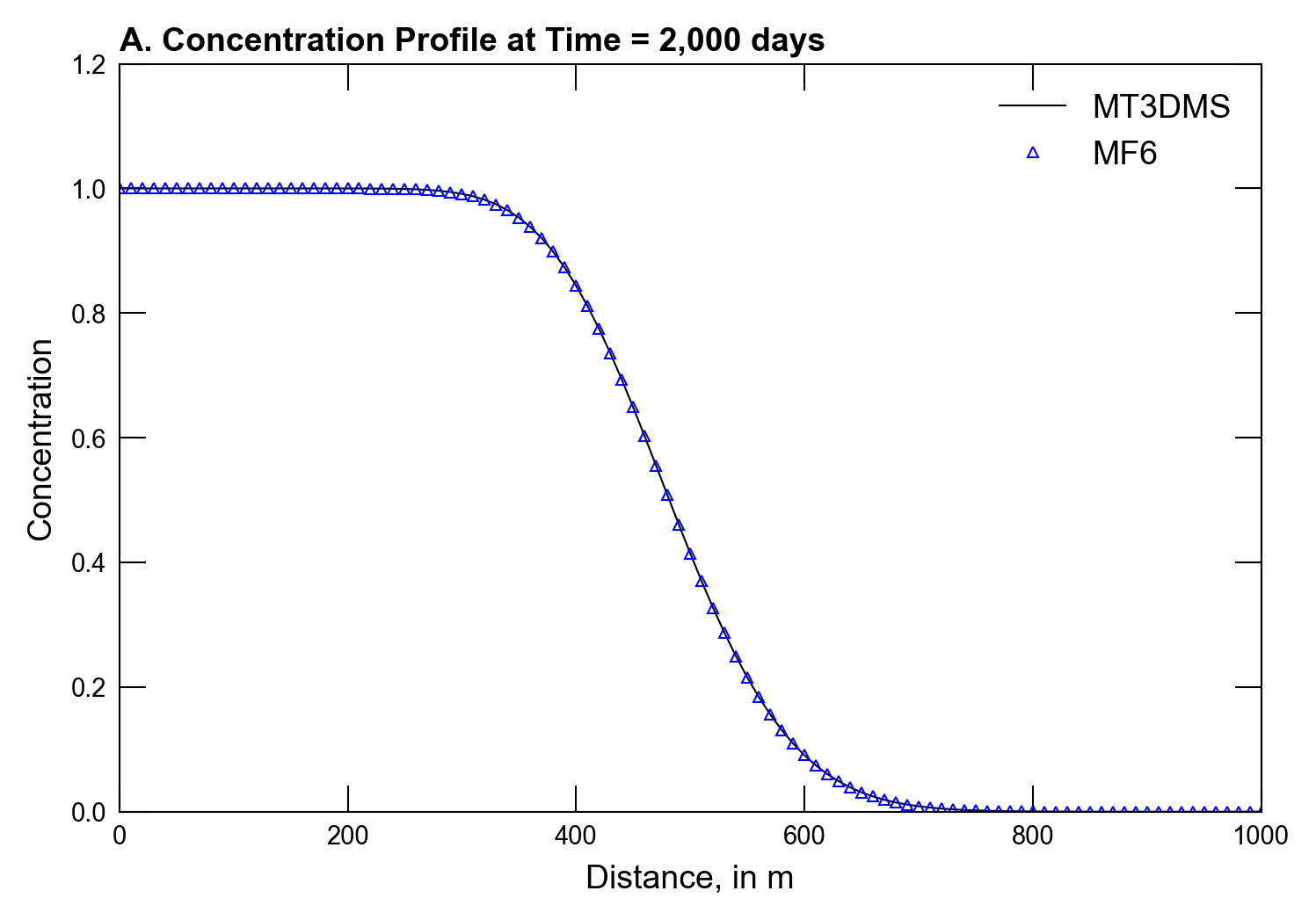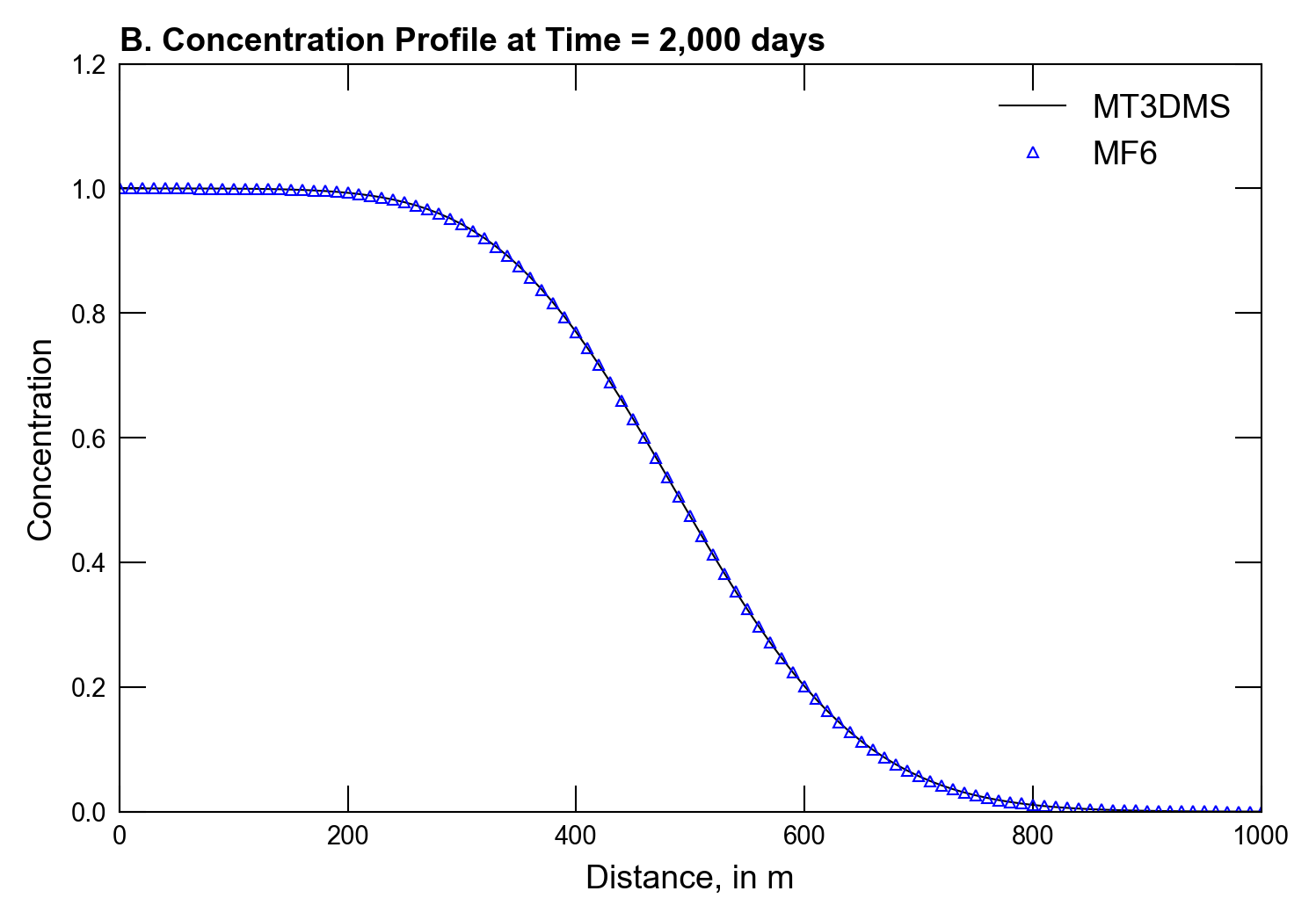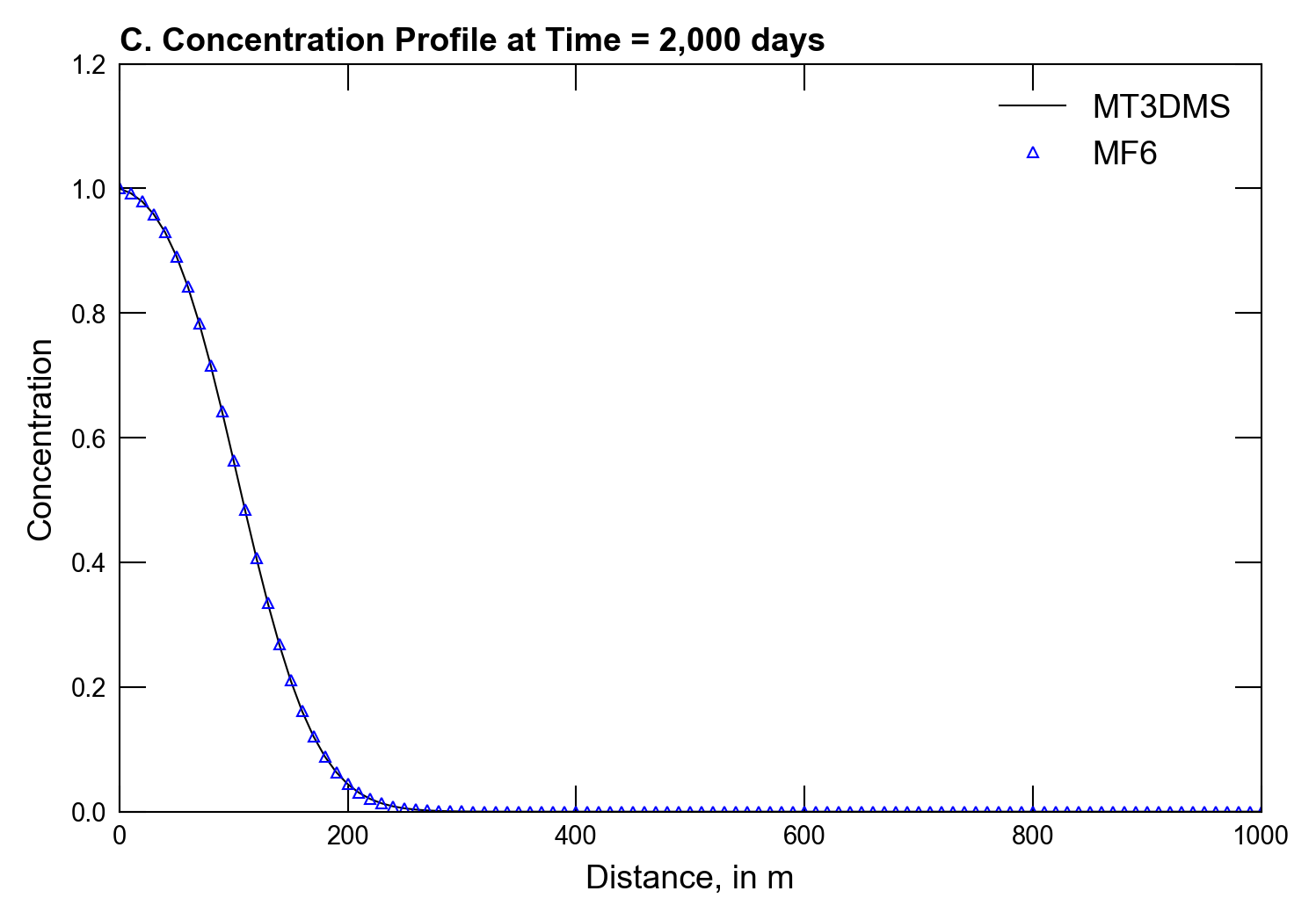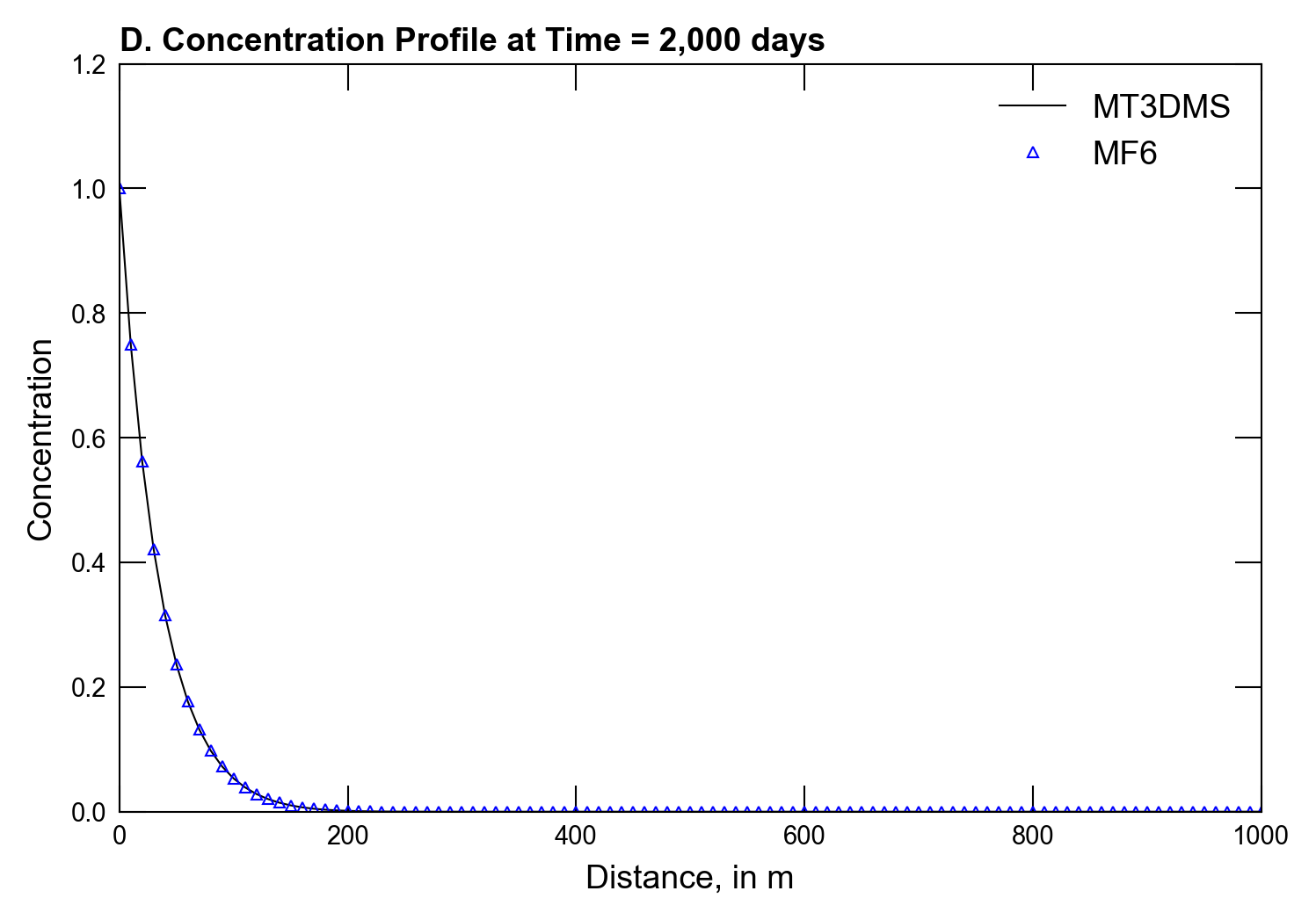One-Dimensional Transport in a Uniform Flow Field Comparison of MODFLOW 6 transport with MT3DMS
The purpose of this script is to (1) recreate the example problems that were first described in the 1999 MT3DMS report, and (2) compare MODFLOW 6-GWT solutions to the established MT3DMS solutions.
Ten example problems appear in the 1999 MT3DMS manual, starting on page 130. This notebook demonstrates example 1 from the list below:
One-Dimensional Transport in a Uniform Flow Field,
One-Dimensional Transport with Nonlinear or Nonequilibrium Sorption,
Two-Dimensional Transport in a Uniform Flow Field,
Two-Dimensional Transport in a Diagonal Flow Field,
Two-Dimensional Transport in a Radial Flow Field,
Concentration at an Injection/Extraction Well,
Three-Dimensional Transport in a Uniform Flow Field,
Two-Dimensional, Vertical Transport in a Heterogeneous Aquifer,
Two-Dimensional Application Example, and
Three-Dimensional Field Case Study.
Initial setup
Import dependencies, define the example name and workspace, and read settings from environment variables.
[1]:
import os
import pathlib as pl
from pprint import pformat
import flopy
import git
import matplotlib.pyplot as plt
import numpy as np
from flopy.plot.styles import styles
from modflow_devtools.misc import get_env, timed
# Example name and workspace paths. If this example is running
# in the git repository, use the folder structure described in
# the README. Otherwise just use the current working directory.
try:
root = pl.Path(git.Repo(".", search_parent_directories=True).working_dir)
except:
root = None
workspace = root / "examples" if root else pl.Path.cwd()
figs_path = root / "figures" if root else pl.Path.cwd()
# Settings from environment variables
write = get_env("WRITE", True)
run = get_env("RUN", True)
plot = get_env("PLOT", True)
plot_show = get_env("PLOT_SHOW", True)
plot_save = get_env("PLOT_SAVE", True)
Define parameters
Define model units, parameters and other settings.
[2]:
# Set scenario parameters (make sure there is at least one blank line before next item)
# This entire dictionary is passed to _build_models()_ using the kwargs argument
parameters = {
"ex-gwt-mt3dms-p01a": {
"dispersivity": 0.0,
"retardation": 1.0,
"decay": 0.0,
},
"ex-gwt-mt3dms-p01b": {
"dispersivity": 10.0,
"retardation": 1.0,
"decay": 0.0,
},
"ex-gwt-mt3dms-p01c": {
"dispersivity": 10.0,
"retardation": 5.0,
"decay": 0.0,
},
"ex-gwt-mt3dms-p01d": {
"dispersivity": 10.0,
"retardation": 5.0,
"decay": 0.002,
},
}
# Scenario parameter units
#
# add parameter_units to add units to the scenario parameter table that is automatically
# built and used by the .tex input
parameter_units = {
"dispersivity": "$m$",
"retardation": "unitless",
"decay": "$d^{-1}$",
}
# Model units
length_units = "meters"
time_units = "days"
# Model parameters
nper = 1 # Number of periods
nlay = 1 # Number of layers
ncol = 101 # Number of columns
nrow = 1 # Number of rows
delr = 10.0 # Column width ($m$)
delc = 1.0 # Row width ($m$)
top = 0.0 # Top of the model ($m$)
botm = -1.0 # Layer bottom elevations ($m$)
prsity = 0.25 # Porosity
perlen = 2000 # Simulation time ($days$)
k11 = 1.0 # Horizontal hydraulic conductivity ($m/d$)
# Set some static model parameter values
k33 = k11 # Vertical hydraulic conductivity ($m/d$)
laytyp = 1
nstp = 100.0
dt0 = perlen / nstp
Lx = (ncol - 1) * delr
v = 0.24
q = v * prsity
h1 = q * Lx
strt = np.zeros((nlay, nrow, ncol), dtype=float)
strt[0, 0, 0] = h1 # Starting head ($m$)
l = 1000.0 # Needed for plots
icelltype = 1 # Cell conversion type
ibound = np.ones((nlay, nrow, ncol), dtype=int)
ibound[0, 0, 0] = -1
ibound[0, 0, -1] = -1
# Set some static transport related model parameter values
mixelm = 0 # TVD
rhob = 0.25
sp2 = 0.0 # red, but not used in this problem
sconc = np.zeros((nlay, nrow, ncol), dtype=float)
dmcoef = 0.0 # Molecular diffusion coefficient
# Set solver parameter values (and related)
nouter, ninner = 100, 300
hclose, rclose, relax = 1e-6, 1e-6, 1.0
ttsmult = 1.0
dceps = 1.0e-5 # HMOC parameters in case they are invoked
nplane = 1 # HMOC
npl = 0 # HMOC
nph = 4 # HMOC
npmin = 0 # HMOC
npmax = 8 # HMOC
nlsink = nplane # HMOC
npsink = nph # HMOC
# Time discretization
tdis_rc = []
tdis_rc.append((perlen, nstp, 1.0))
# Create MODFLOW 6 GWT MT3DMS Example 1 Boundary Conditions
# Constant head cells are specified on both ends of the model
chdspd = [[(0, 0, 0), h1], [(0, 0, ncol - 1), 0.0]]
c0 = 1.0
cncspd = [[(0, 0, 0), c0]]
Model setup
Define functions to build models, write input files, and run the simulation.
[3]:
def build_models(
sim_name,
dispersivity=0.0,
retardation=0.0,
decay=0.0,
mixelm=0,
silent=False,
):
mt3d_ws = os.path.join(workspace, sim_name, "mt3d")
modelname_mf = "p01-mf"
# Instantiate the MODFLOW model
mf = flopy.modflow.Modflow(
modelname=modelname_mf, model_ws=mt3d_ws, exe_name="mf2005"
)
# Instantiate discretization package
# units: itmuni=4 (days), lenuni=2 (m)
flopy.modflow.ModflowDis(
mf,
nlay=nlay,
nrow=nrow,
ncol=ncol,
delr=delr,
delc=delc,
top=top,
nstp=nstp,
botm=botm,
perlen=perlen,
itmuni=4,
lenuni=2,
)
# Instantiate basic package
flopy.modflow.ModflowBas(mf, ibound=ibound, strt=strt)
# Instantiate layer property flow package
flopy.modflow.ModflowLpf(mf, hk=k11, laytyp=laytyp)
# Instantiate solver package
flopy.modflow.ModflowPcg(mf)
# Instantiate link mass transport package (for writing linker file)
flopy.modflow.ModflowLmt(mf)
# Transport
modelname_mt = "p01-mt"
mt = flopy.mt3d.Mt3dms(
modelname=modelname_mt,
model_ws=mt3d_ws,
exe_name="mt3dms",
modflowmodel=mf,
)
c0 = 1.0
icbund = np.ones((nlay, nrow, ncol), dtype=int)
icbund[0, 0, 0] = -1
sconc = np.zeros((nlay, nrow, ncol), dtype=float)
sconc[0, 0, 0] = c0
flopy.mt3d.Mt3dBtn(
mt,
laycon=laytyp,
icbund=icbund,
prsity=prsity,
sconc=sconc,
dt0=dt0,
ifmtcn=1,
)
# Instatiate the advection package
flopy.mt3d.Mt3dAdv(
mt,
mixelm=mixelm,
dceps=dceps,
nplane=nplane,
npl=npl,
nph=nph,
npmin=npmin,
npmax=npmax,
nlsink=nlsink,
npsink=npsink,
percel=0.5,
)
# Instantiate the dispersion package
flopy.mt3d.Mt3dDsp(mt, al=dispersivity)
# Set reactive variables and instantiate chemical reaction package
if retardation == 1.0:
isothm = 0.0
rc1 = 0.0
else:
isothm = 1
if decay != 0:
ireact = 1
rc1 = decay
else:
ireact = 0.0
rc1 = 0.0
kd = (retardation - 1.0) * prsity / rhob
flopy.mt3d.Mt3dRct(
mt,
isothm=isothm,
ireact=ireact,
igetsc=0,
rhob=rhob,
sp1=kd,
rc1=rc1,
rc2=rc1,
)
# Instantiate the source/sink mixing package
flopy.mt3d.Mt3dSsm(mt)
# Instantiate the GCG solver in MT3DMS
flopy.mt3d.Mt3dGcg(mt, mxiter=10)
# MODFLOW 6
name = "p01-mf6"
gwfname = "gwf-" + name
sim_ws = os.path.join(workspace, sim_name)
sim = flopy.mf6.MFSimulation(sim_name=sim_name, sim_ws=sim_ws, exe_name="mf6")
# Instantiating MODFLOW 6 time discretization
flopy.mf6.ModflowTdis(sim, nper=nper, perioddata=tdis_rc, time_units=time_units)
# Instantiating MODFLOW 6 groundwater flow model
gwf = flopy.mf6.ModflowGwf(
sim,
modelname=gwfname,
save_flows=True,
model_nam_file=f"{gwfname}.nam",
)
# Instantiating MODFLOW 6 solver for flow model
imsgwf = flopy.mf6.ModflowIms(
sim,
print_option="SUMMARY",
outer_dvclose=hclose,
outer_maximum=nouter,
under_relaxation="NONE",
inner_maximum=ninner,
inner_dvclose=hclose,
rcloserecord=rclose,
linear_acceleration="CG",
scaling_method="NONE",
reordering_method="NONE",
relaxation_factor=relax,
filename=f"{gwfname}.ims",
)
sim.register_ims_package(imsgwf, [gwf.name])
# Instantiating MODFLOW 6 discretization package
flopy.mf6.ModflowGwfdis(
gwf,
length_units=length_units,
nlay=nlay,
nrow=nrow,
ncol=ncol,
delr=delr,
delc=delc,
top=top,
botm=botm,
idomain=np.ones((nlay, nrow, ncol), dtype=int),
filename=f"{gwfname}.dis",
)
# Instantiating MODFLOW 6 node-property flow package
flopy.mf6.ModflowGwfnpf(
gwf,
save_flows=False,
icelltype=icelltype,
k=k11,
k33=k33,
save_specific_discharge=True,
filename=f"{gwfname}.npf",
)
# Instantiating MODFLOW 6 initial conditions package for flow model
flopy.mf6.ModflowGwfic(gwf, strt=strt, filename=f"{gwfname}.ic")
# Instantiating MODFLOW 6 constant head package
flopy.mf6.ModflowGwfchd(
gwf,
maxbound=len(chdspd),
stress_period_data=chdspd,
save_flows=False,
pname="CHD-1",
filename=f"{gwfname}.chd",
)
# Instantiating MODFLOW 6 output control package for flow model
flopy.mf6.ModflowGwfoc(
gwf,
head_filerecord=f"{gwfname}.hds",
budget_filerecord=f"{gwfname}.cbc",
headprintrecord=[("COLUMNS", 10, "WIDTH", 15, "DIGITS", 6, "GENERAL")],
saverecord=[("HEAD", "LAST"), ("BUDGET", "LAST")],
printrecord=[("HEAD", "LAST"), ("BUDGET", "LAST")],
)
# Instantiating MODFLOW 6 groundwater transport package
gwtname = "gwt-" + name
gwt = flopy.mf6.MFModel(
sim,
model_type="gwt6",
modelname=gwtname,
model_nam_file=f"{gwtname}.nam",
)
gwt.name_file.save_flows = True
imsgwt = flopy.mf6.ModflowIms(
sim,
print_option="SUMMARY",
outer_dvclose=hclose,
outer_maximum=nouter,
under_relaxation="NONE",
inner_maximum=ninner,
inner_dvclose=hclose,
rcloserecord=rclose,
linear_acceleration="BICGSTAB",
scaling_method="NONE",
reordering_method="NONE",
relaxation_factor=relax,
filename=f"{gwtname}.ims",
)
sim.register_ims_package(imsgwt, [gwt.name])
# Instantiating MODFLOW 6 transport discretization package
flopy.mf6.ModflowGwtdis(
gwt,
nlay=nlay,
nrow=nrow,
ncol=ncol,
delr=delr,
delc=delc,
top=top,
botm=botm,
idomain=1,
filename=f"{gwtname}.dis",
)
# Instantiating MODFLOW 6 transport initial concentrations
flopy.mf6.ModflowGwtic(gwt, strt=sconc, filename=f"{gwtname}.ic")
# Instantiating MODFLOW 6 transport advection package
if mixelm == 0:
scheme = "UPSTREAM"
elif mixelm == -1:
scheme = "TVD"
else:
raise Exception()
flopy.mf6.ModflowGwtadv(gwt, scheme=scheme, filename=f"{gwtname}.adv")
# Instantiating MODFLOW 6 transport dispersion package
if dispersivity != 0:
flopy.mf6.ModflowGwtdsp(
gwt,
xt3d_off=True,
alh=dispersivity,
ath1=dispersivity,
filename=f"{gwtname}.dsp",
)
# Instantiating MODFLOW 6 transport mass storage package (formerly "reaction" package in MT3DMS)
if retardation != 1.0:
sorption = "linear"
bulk_density = rhob
kd = (retardation - 1.0) * prsity / rhob # prsity & rhob defined in
else: # global variable section
sorption = None
bulk_density = None
kd = None
if decay != 0.0:
first_order_decay = True
decay_arg = decay
else:
first_order_decay = False
decay_arg = None
flopy.mf6.ModflowGwtmst(
gwt,
porosity=prsity,
sorption=sorption,
bulk_density=bulk_density,
distcoef=kd,
first_order_decay=first_order_decay,
decay=decay_arg,
decay_sorbed=decay_arg,
filename=f"{gwtname}.mst",
)
# Instantiating MODFLOW 6 transport constant concentration package
flopy.mf6.ModflowGwtcnc(
gwt,
maxbound=len(cncspd),
stress_period_data=cncspd,
save_flows=False,
pname="CNC-1",
filename=f"{gwtname}.cnc",
)
# Instantiating MODFLOW 6 transport source-sink mixing package
flopy.mf6.ModflowGwtssm(gwt, sources=[[]], filename=f"{gwtname}.ssm")
# Instantiating MODFLOW 6 transport output control package
flopy.mf6.ModflowGwtoc(
gwt,
budget_filerecord=f"{gwtname}.cbc",
concentration_filerecord=f"{gwtname}.ucn",
concentrationprintrecord=[("COLUMNS", 10, "WIDTH", 15, "DIGITS", 6, "GENERAL")],
saverecord=[("CONCENTRATION", "LAST"), ("BUDGET", "LAST")],
printrecord=[("CONCENTRATION", "LAST"), ("BUDGET", "LAST")],
)
# Instantiating MODFLOW 6 flow-transport exchange mechanism
flopy.mf6.ModflowGwfgwt(
sim,
exgtype="GWF6-GWT6",
exgmnamea=gwfname,
exgmnameb=gwtname,
filename=f"{name}.gwfgwt",
)
return mf, mt, sim
def write_models(mf2k5, mt3d, sim, silent=True):
mf2k5.write_input()
mt3d.write_input()
sim.write_simulation(silent=silent)
@timed
def run_models(mf2k5, mt3d, sim, silent=True):
"""Run models and assert successful completion."""
success, buff = mf2k5.run_model(silent=silent, report=True)
assert success, pformat(buff)
success, buff = mt3d.run_model(
silent=silent, report=True, normal_msg="Program completed"
)
assert success, pformat(buff)
success, buff = sim.run_simulation(silent=silent, report=True)
assert success, pformat(buff)
Plotting results
Define functions to plot model results.
[4]:
# Figure properties
figure_size = (5, 3.5)
def plot_results(mt3d, mf6, idx, ax=None):
mt3d_out_path = mt3d.model_ws
mf6.simulation_data.mfpath.get_sim_path()
# Get the MT3DMS concentration output
fname_mt3d = os.path.join(mt3d_out_path, "MT3D001.UCN")
ucnobj_mt3d = flopy.utils.UcnFile(fname_mt3d)
conc_mt3d = ucnobj_mt3d.get_alldata()
# Get the MF6 concentration output
gwt = mf6.get_model(list(mf6.model_names)[1])
ucnobj_mf6 = gwt.output.concentration()
conc_mf6 = ucnobj_mf6.get_alldata()
# Create figure for scenario
with styles.USGSPlot() as fs:
sim_name = mf6.name
if ax is None:
fig, ax = plt.subplots(
1, 1, figsize=figure_size, dpi=300, tight_layout=True
)
ax.plot(
np.linspace(0, l, ncol),
conc_mt3d[0, 0, 0, :],
color="k",
label="MT3DMS",
linewidth=0.5,
)
ax.plot(
np.linspace(0, l, ncol),
conc_mf6[0, 0, 0, :],
"^",
markeredgewidth=0.5,
color="blue",
fillstyle="none",
label="MF6",
markersize=3,
)
ax.set_ylim(0, 1.2)
ax.set_xlim(0, 1000)
ax.set_xlabel("Distance, in m")
ax.set_ylabel("Concentration")
title = "Concentration Profile at Time = 2,000 " + "{}".format(time_units)
ax.legend()
letter = chr(ord("@") + idx + 1)
styles.heading(letter=letter, heading=title)
if plot_show:
plt.show()
if plot_save:
fpth = figs_path / f"{sim_name}.png"
fig.savefig(fpth)
Running the example
Define and invoke a function to run the example scenario, then plot results.
[5]:
def scenario(idx, silent=True):
key = list(parameters.keys())[idx]
parameter_dict = parameters[key]
mf2k5, mt3d, sim = build_models(key, **parameter_dict)
if write:
write_models(mf2k5, mt3d, sim, silent=silent)
if run:
run_models(mf2k5, mt3d, sim, silent=silent)
if plot:
plot_results(mt3d, sim, idx)
Run advection only scenario.
[6]:
scenario(0)
run_models took 185.14 ms

Run advection and dispersion scenario.
[7]:
scenario(1)
run_models took 270.71 ms

Run advection, dispersion, and retardation scenario.
[8]:
scenario(2)
run_models took 192.15 ms

Run advection, dispersion, retardation, and decay scenario.
[9]:
scenario(3)
run_models took 270.19 ms
